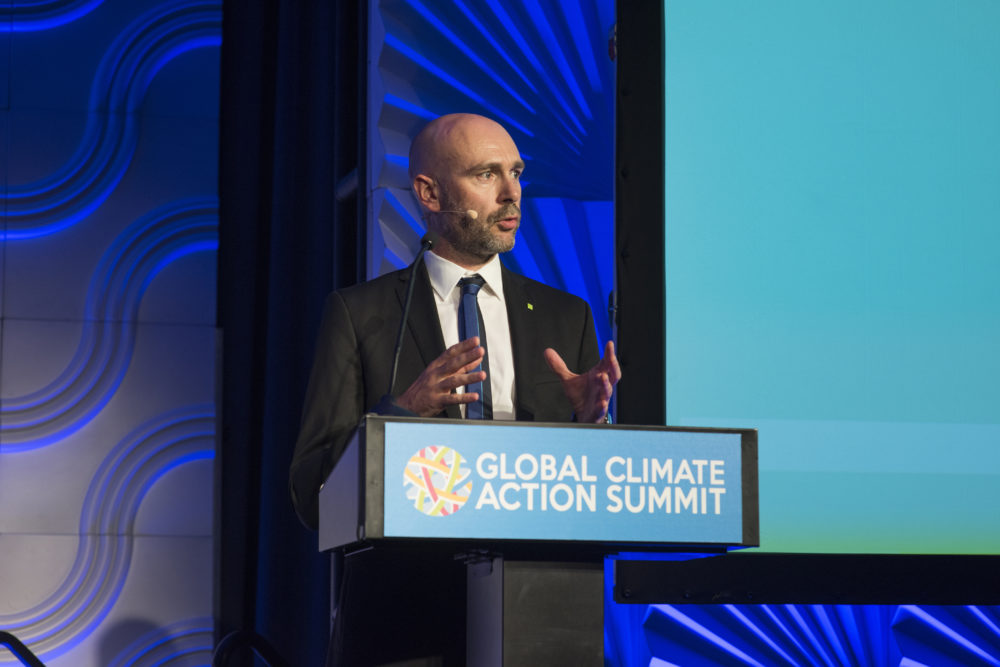Advertisement
World Mayors Announce Support For Global Green New Deal At Denmark Climate Summit
Resume
Mayors from some of the world’s biggest cities on Wednesday threw their support behind a Global Green New Deal to “build a more equitable future by cutting carbon emissions.”
Leaders from the C40 Cities group of mayors — which represents more than 90 cities around the world — made the commitment at a summit in Copenhagen, Denmark, to discuss what their urban areas can do to combat climate change. The gathering comes a month after world leaders met at the United Nations Climate Summit in New York.
Mark Watts, executive director of C40 Cities, says that unlike the countries of the world, cities have already been collaborating on how to reach zero-carbon emissions.
“They're completely focused on science-based targets around climate change, partly because they're on the front line of climate impacts, these big cities, the ones that are really feeling the effects of flooding, etc.,” Watts says. “But also because they can just see that shifting as fast as possible to a low carbon economy is the best thing for their cities.”
The group of mayors also sharply criticized countries for failing to agree to strong climate measures at last month’s U.N. Climate Summit.
“The whole world economy, the whole world of politics needs to be massively disrupted because we're in a real life and death situation with a very short amount of time to fundamentally change the way we live in our economies for the better,” Watts says. “And that's only going to happen if the whole of society really feels it is a priority and something that has to be tackled.”
Interview Highlights
On what cities are already doing to reach zero-carbon emissions
“The first and most important thing is [to] set the bar right. And so we started that three years ago [when] the mayors and C40 adopted as a condition of membership of our organization that every mayor would set out a robust plan for how they would stay within the carbon budget that's allowed them to make that Paris climate agreement a reality.
“The city that we're in today, Copenhagen, really [is] one of the world leaders on target to be carbon neutral by 2025. If you travel around here, half of the people make their trips to work on a bicycle. But look elsewhere, London has managed to now shift away from car usage to mass transit, cycling and walking. New York is a symbol to many with the mandate that Mayor de Blasio has brought in recently for retrofitting those hugely iconic skyscrapers. Elsewhere in the world, we look at Sydney and Melbourne, now most of these big cities are really shifting onto a climate neutral agenda now.”
On the goal to reach zero emissions by 2030
“Well, it's where we have to get to. So what all of the world's leading scientists show is that global emissions have to be cut in half within the next decade. And if you look at that in an urban context, that means you've got to get in place the policies by 2030 that set the conditions for those city economies for the rest of the century. But this shouldn't be looked at as a hardship. This is a huge opportunity. This is a once in a century chance to take that incredible investment that's going to go into delivering zero-emission transit, zero-emission buildings, etc., and use that to fix the problems of a global economy that's failing so many people at the moment. So we can help bring people out of poverty faster with this big investment, but also make sure that the world's much more equitable and there's much less inequality in it.”
On how much of an impact cities can make without national governments
“There's no way around it. We, ultimately, if we're going to avoid climate breakdown and get out of what is now real climate emergency, then it has to have the leadership of national governments and the biggest polluting ones. And at the moment, it will not be possible to overcome the climate crisis unless there's a shift in those in Brazil and the United States, in particular, but you can add Russia and Australia to that list as well.
“But in the meantime, let's get the momentum. Let's get moving in the right direction. And what these big city mayors do, when they decide that they're going to shift away from diesel buses and are going to shift to electric or zero-emission buses, it changes the whole world market because they're the biggest buyers of them. When they decide to implement zero-emission building codes, it changes the whole construction market around the world. So they can have a real effect on the real world economy, and hopefully buy some time then for the national governments to catch up.”
On if disruptive protests are helpful
“I think it's an entirely rational response of people once it's understood that we really are in a climate emergency and your leaders appear not to be taking science seriously, not reacting, that you have to mobilize. You have to go out and you have to make your voices loudly heard. And for everything I've seen, extinction rebellion is taking a peaceful path to more disruptive protest, but it's a consequence of the failure of that leadership that they're needing to take those tactics.”
Ashley Locke produced and edited this interview for broadcast with Todd Mundt. Samantha Raphelson adapted it for the web.
This segment aired on October 9, 2019.
